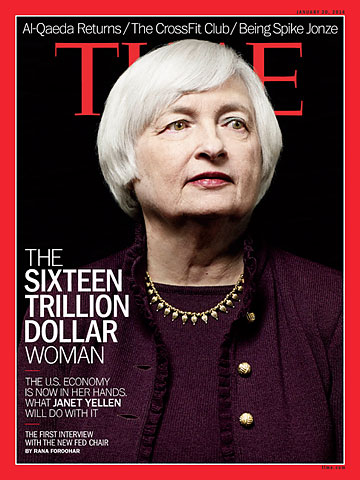
(5 of 7)
Yellen also projects an air of unflappability that could serve the economy well in any future crisis. The obvious example: the drama last year about whether President Obama would tap her for the Fed job. The trouble began just as summer gave way to fall. Yellen had previously been a shoo-in to succeed Bernanke. But then the whispers started: Yellen lacked understanding of the financial markets, some said; she didn't have the gravitas for the top job, suggested others. Along with the whispers came an implication: Lawrence Summers, who had served as Bill Clinton's Treasury Secretary and a key Obama adviser during the financial crisis, would make a much better pick. Summers wanted the Fed job badly--and his supporters were only too happy to drop oddly dismissive comments about Yellen around policy circles. The Summers drumbeat grew. Yellen was suddenly down.
But not out. Even as the rumors anointed Summers as front runner, Yellen sat in her office at the Fed's marble-clad headquarters on Constitution Avenue, seemingly unworried. "She just smiled a little and said, 'Don't count me out yet,'" recalls Laurence Meyer, a renowned economic forecaster and former Fed governor who visited her in September. And soon after, the spin reversed. More than 500 top economists, including a Nobel Prize winner and a former Fed vice chair, signed a letter to Obama supporting her nomination. Liberal Democrats like Senators Elizabeth Warren and Dick Durbin chimed in too. Yellen, supporters argued, would take on big banks to make the financial system safer--a contrast to Summers, a wealthy refugee from a hedge fund. By mid-September, Summers withdrew his name from consideration, and a few weeks later Obama, faced with a populist backlash from within his own party, nominated Yellen for the position.
Through it all, Yellen--who loathes Beltway politics yet deftly allowed the drama to run its course--remained steadfast. "The way in which Janet handled the whole thing really raised my already high opinion of her," says Dallas Fed president Richard Fisher, who often disagrees with Yellen on policy but nonetheless supported her nomination. "She was steady and evenhanded, and she didn't overreact. It's exactly what you want in a Fed leader." Adds Fisher: "Sometimes nice guys do finish first."
She'll need both patience and resolve to corral the 18 other Fed policymakers (12 regional presidents and six governors in Washington) on the Federal Open Market Committee, the key group that sets monetary policy, many of whom have gotten quite bold about bolting for CNBC at the end of every meeting to spread their own views about where the economy is going. Yellen made it clear in an 80-minute interview that while she's in favor of independent thinking and expression of views, her job is to put forth the consensus view, and that's the one that the markets should respond to. That could include holding more frequent press conferences, which many people close to her speculate she may be open to.
